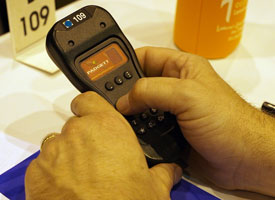By Joe Isenhower Jr. (joe.isenhower@lcms.org)
On July 9 — a year to the day before the Synod’s 66th Regular Convention is scheduled to start in Milwaukee — LCMS President Rev. Dr. Matthew C. Harrison sent an email to rostered LCMS church workers announcing availability of the report of a Synod task force that makes recommendations concerning licensed lay deacons in the church body.
The seven-member task force that Harrison appointed in response to Resolution 4-06A of the 2013 Synod convention is simply known as “the Resolution 4-06A Task Force.” Its 32-page report and a two-page executive summary of that report are available for download at the “National LCMS Convention” Web page.
That 2013 resolution asked Harrison to appoint a “task force to address questions about the practice of licensed laymen who are preaching and administering the Sacraments in LCMS congregations,” he notes in the email.
The resolution specifically called for the task force “to develop a plan anchored in the Word, in consultation with licensed lay deacons and those who supervise and are served by them, to resolve questions about the service of licensed lay deacons serving congregations of [the LCMS] with the Word and sacraments of Christ; and “that the plan and its proposed implementation be reported to the Synod one year before the 2016 convention.”
“Our Synod has, for over 25 years,” Harrison writes in his July 9 message, “struggled with the question of how to provide pastoral care for congregations and missions — typically with small numbers of individuals — facing challenging circumstances, such as geographical isolation, limited financial resources, or when a mission or congregation consists of individuals from an ethnic or linguistic minority. These are genuine practical dilemmas, and the church needs to address them with theological fidelity.”
Basically — as outlined in the executive summary of the task force report — that “struggle” centers on questions raised about laymen providing such pastoral care, “often for no remuneration, and under the supervision of an ordained pastor,” and “theological objections raised, primarily on the basis of [Article XIV of the Augsburg Confession].”
The Augsburg Confession is a foundational document of Lutheran theology. Article XIV, titled “Concerning Church Government,” begins with the statement, “Concerning church government it is taught that no one should publicly teach, preach, or administer the sacraments without a proper [public] call.”
“The task force … has addressed this matter,” Harrison states later in the email. “I believe they have done so in a way that holds together both the church’s mission and its theology.
“I commend their report to the Synod for study,” Harrison continues, and then invites readers to submit their reactions to the report at lcms.org/response/4-06A.
Members of the task force include representatives of the LCMS Council of Presidents, the Commission on Theology and Church Relations (CTCR), the Office of the President and the two LCMS seminaries, as well as a licensed lay deacon. The Rev. Larry M. Vogel, associate executive director of the CTCR, is chairman.
“Central concerns for the task force,” Vogel told Reporter via email, “were to proceed in a way that encourages a godly harmony regarding pastoral care in challenging circumstances (which will not diminish in the future) and the importance of retaining both scriptural/confessional theological practices together with an uncompromising commitment to the mission of sharing the Gospel with the nations.”
The task force makes eight recommendations in its report. Summarized in four points, the task-force recommendations include:
“1. Lay deacons who are regularly serving pastorally — as the de facto pastors of LCMS congregations — should be examined by a special LCMS colloquy process, receive further theological preparation where necessary, and be approved for ordination. Their roster status would be that of a Specific Ministry Pastor (SMP). (See Recommendation 1.)
“2. The ongoing reality of geographic, financial, and demographic challenges that make it difficult to fill the calling needs of LCMS congregations and missions should be addressed by means of SMP and various other non-residential pastoral-training programs in which future pastors are identified locally and then prepared for service. Need-based financial assistance for preparation will be available through the Pastoral Education Department of the LCMS. (See Recommendations 2 and 3.)
“3. Districts should not neglect to explore other means of addressing the challenges to provide the ministry of Word and Sacrament for its (sic) congregations and missions. Such means include multi-point parishes, technological aids, and greater use of inactive pastors. (See Recommendations 4, 5, and 6.)
“4. The role of the royal priesthood of baptized believers is not demeaned, but enhanced by a right understanding and practice of the Office of Public Ministry, for as believers share the Gospel in their daily lives and vocations, they are and always have been the primary arm of Christian outreach to an unbelieving world. This evangelistic or witnessing role should be emphasized and enhanced, not diminished. (See Recommendations 7 and 8.)”
The task-force report also will appear in the 2016 Convention Workbook that will contain reports and overtures (proposed actions) to be considered by floor committees meeting next May that will draft resolutions for the convention. The convention is set for July 9-14 at the Wisconsin Center in Milwaukee.
Posted July 13, 2015
